Iran’s Guards Unveil Underground Missile Bases Amid Nuclear Talks
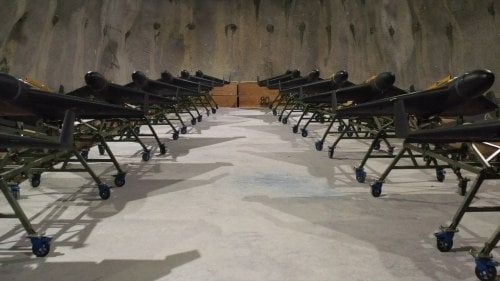
Iran’s Revolutionary Guard has unveiled two underground bases for attack drones and missiles, as nuclear talks with world power have reached a critical stage.

Iran’s Revolutionary Guard has unveiled two underground bases for attack drones and missiles, as nuclear talks with world power have reached a critical stage.
The “two cities of missiles and drones” were inaugurated on Saturday concurrent with the visit of International Atomic Energy Agency Director General Rafael Mariano Grossi to Tehran and the final days of the Vienna talks to revive the 2015 nuclear deal known as JCPOA.
According to Sepah News, IRGC’s information website, the bases are constructed in the form of tunnels (video) in the heart of high mountains and house ground-to-ground missile systems and attack drones, including drones with a range of 2,000 kilometers, two-missile launch platforms and multi-drone launch platforms. The locations of the bases are not disclosed.
The commander IRGC’s Aerospace Force, Brigadier General Amir-Ali Hajizadeh, emphasized the long range of the drones and the capacity of these bases during a ceremony, saying that “We can simultaneously launch 60 UAVs from the drone base” and “we can hit any hostile target.”
Hajizadeh added, “The power of our missile fire and simultaneous launches have increased more than six to seven times, and the preparation time… has been greatly reduced.”
Pentagon says it is working hard to contribute to the self-defense needs of allies and partners in the region to counter threats posed by Iran’s missile program while Iran says it will become one of the world's biggest arms exporters once US sanctions are lifted.

International human rights organization Amnesty International says imprisoned Iranian activist Abbas Vahedian Shahroudi health has seriously deteriorated in solitary confinement.
In a statement on Friday, the UK-based rights group said that Iran’s Intelligence Ministry and prosecutors in Mashhad – in the northeastern province of Khorasan-e Razavi – are endangering the life and safety of the “tortured activist”. Vahedian was one of the signatories of a letter calling for the resignation of Supreme Leader Ali Khamenei.
Amnesty said the authorities are “deliberately denying him adequate medical care and keeping him in prolonged solitary confinement”.
“The authorities are concealing the circumstances leading to two episodes of emergency hospitalization between 24 and 28 February 2022 and denying him visits with his family and lawyer”, the statement added.
Vahedian and his daughter were assaulted and beaten when security forces barged into his home to arrest him.
In 2019, Vahedian and 13 other political activists wrote a letter to Khamenei, calling for his resignation and changing the constitution, saying “the current regime is irredeemable and insists on its mistakes and adds to its tyranny”.
Iranian security has been denying medical care to prominent political prisoners in recent months. They have reportedly denied activist Sepideh Gholian (Qolian) sick leave for her severe Covid-19 symptoms. One month earlier, Baktash Abtin, another activist, died of Covid complications after being denied timely treatment in Tehran’s Evin prison.
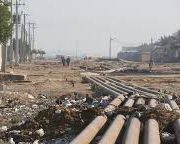
It could take months before any large quantities of Iranian oil hit the markets if a nuclear deal is reached and sanctions lifted, a Reuters analysis said on Friday.
With oil prices hitting almost $120 this week, market watchers await the outcome of indirect talks between the United States and Iran in Vienna to see if sanctions imposed on Tehran’s oil exports will be lifted and global supplies boosted amid the Ukraine crisis.
However, any agreement will not immediately allow Iran to legally export oil as compliance with the agreement would take a few months to verify, Reuters said, adding that the same happened in when the first nuclear deal was inked in 2015 when it took a few months until Iran began exporting crude.
Most refiners around the world have also shunned Iranian oil for several years and they would need two to three months to finalize technical arrangements to enable imports from Iran to resume, analysts said.
Iran has tens of millions of barrels of oil in storage that can be released once its compliance with the nuclear agreement is verified, but some of that oil is heavy condensate and not very helpful to lower prices.
The analysis said that it would take Iran up to six months to raise output by around one million barrels per day.
OPEC led by Saudi Arabia has refused to break an agreementreached before the Russian invasion and boost output.
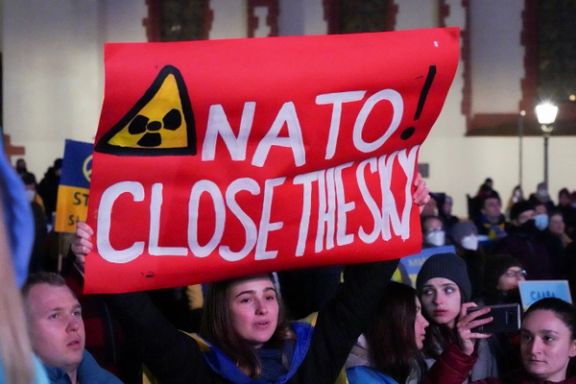
Iran's Friday imams across the country condemned the United States over the Ukraine war, following the government's position of support for the Russian ally.
"The American adventurisms are behind the recent incidents in Ukraine,” Mohammad-Javad Haj-Aliakbari told Tehran's Friday prayer congregation. “The one responsible is America, which has sacrificed Ukraine to its own greed.”
In Qom, the imam Mohammad Saeedi said “America and the western barbarians wage regional and international wars to sell their weapons." He suggested that "the management of the world" would be better in the hands of "pious people."
In Sari, provincial capital of Mazandaran, Mohammad-Bagher Mohammadi said Moscow was entitled to ensure its own security given Nato’s expansion in eastern Europe. Russia “attacked Ukraine to make Nato give up its meaningless thoughts,” he told his congregation.
Ali Khamenei, Iran’s Supreme Leader Tuesday called for a peaceful settlement while suggesting Ukraine had fallen victim to US policies. “Support by Western governments for administrations and politicians that have been installed by them is a mirage,” Khamenei said, referring to the messy withdrawal of forces from Afghanistan after Washington’s agreement with the Taliban.
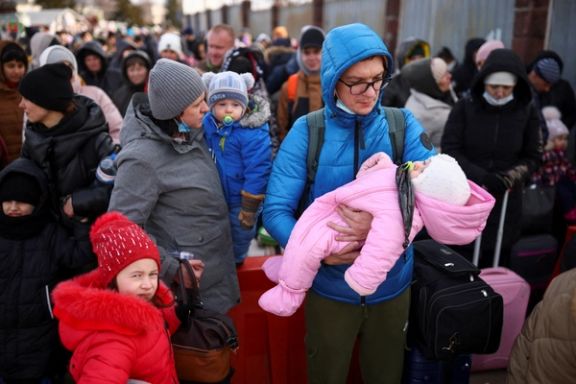
Khamenei also claimed that Ukrainians were not resisting strongly "because they did not agree with [their] government." Kayhan newspaper made a similar allegation this week referring to “scarecrow” defense, while the world has watched the fighting and many have admired the Ukrainian resistance to the invasion.
Puppets
Hasan Alidadi, Friday imam in Kerman province, made similar remarks in his sermon Friday: "Regarding the recent Russian attack on Ukraine…when governments are puppets and people's role is not marked, city after city surrenders as fast as you see." Yousef Tabatabeinejad, the Friday imam in Esfahan, also argued Ukrainians were leaving because "they are not in agreement with the government".
General guidelines for over 600 Friday sermons are set out by the Friday Prayer Policymaking Council, whose head and members are appointed by Khamenei.
Alongside India, Iraq, Pakistan and South Africa, Iran was among 35 countries that abstained from a vote Wednesday at UN General Assembly condemning Russia over its invasion of Ukraine. Four countries − Belarus, North Korea, Eritrea and Syria − joined Russia in voting against the motion. Israel ended up voting in favor after earlier expressing neutrality.
Support voiced for Ukraine
While the government, its media and imams have supported Russia, thousands of Iranians on social media have condemned the invasion and vented anger at leaders for siding with Moscow.
Even in government-controlled media, some pundits and editors have cautiously criticized Russia and demanded a more neutral position by Iran.
Mohammad-Reza Khabbaz, a reformist former member of parliament, told Arman-e Melli newspaper in an article published Thursday that he had expected Iran “to oppose such aggression and condemn it in the early days.” Khabbaz said Iran should “condemn those [in the west] who were responsible for creating these circumstances but shouldn't allow Russia to take benefit from our silence.”
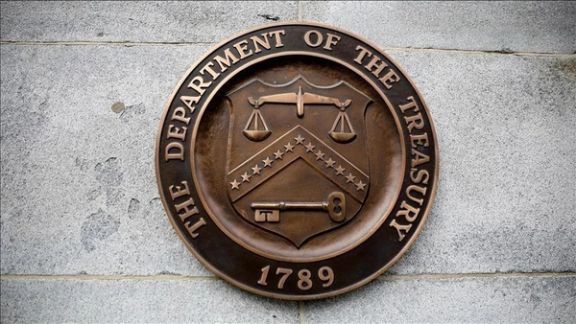
The United States Department of the Treasury has sanctioned two key financiers of Iran-backed Hezbollah group operating in Guinea.
On Friday, the Treasury’s Office of Foreign Assets Control (OFAC) designated prominent Lebanese businessmen Ali Saade and Ibrahim Taher under Executive Order 13224 -- declared by former President George W Bush in 2001 – that targets terrorists, leaders, and official of terrorist groups, and those providing support to terrorists or acts of terrorism.
Saade – with links to designated Hezbollah supporter Kassim Tajideen -- initiated money transfers from Guinea to the Iran-backed group in Lebanon. Taher has been identified as one of the most prominent financial supporters of the group in Guinea, who is believed to employ several individuals affiliated with Hezbollah within the country.
Tajideen was freed from jail in the United States in June 2020 as a result of indirect contacts between Tehran and Washington.
According to a statement by the Treasury, the new sanctions are aimed at “disrupting Hezbollah’s business network in West Africa” and exposing “businessmen who support Hezbollah’s destabilizing activities through bribes and other corrupt activity”.
The United States designated Hezbollah as a Foreign Terrorist Organization on October 8, 1997, and as a Specially Designated Global Terrorist (SDGT) on October 31, 2001.
In January, US sanctioned three other individuals and their company with links to Hezbollah for exploiting Lebanon's economic resources for the benefit of the militant group.

Victims of the 9/11 terror attacks seek the seizure of Iranian crude oil from a tanker to help satisfy a $3.61 billion judgment against Iran over the attacks.
The request came in filings on Thursday with the US District Court in Manhattan.
The filings come as US investigators continue to probe the alleged involvement of the Suez Rajan, owned by Los Angeles-based private equity firm Oaktree Capital Management, in the sanctioned trade of Iranian oil as negotiations continue over Tehran’s nuclear deal with world powers.
Dozens of attack victims and their families said the Suez Rajan, idling in Southeast Asia, appeared to be carrying up to 1 million barrels of Iranian oil, violating US sanctions.
They said the oil should be seized and sold by the United States to help cover their February 2018 judgment against Iran over that country's providing material support to al-Qaeda related to the attacks. Iran has long denied such claims.
Oaktree has about $166 billion of assets under management. Neither the firm nor its London-based Fleetscape unit, which finances the Suez Rajan, immediately responded on Friday to requests for comment by Reuters.
The request came after the nonprofit United Against Nuclear Iran, which uses satellite images to track tanker movement, wrote Oaktree on February 15 that the Suez Rajan appeared to have taken on the oil from another tanker two days earlier.
Satellite photos from Planet Labs PBC of that area obtained by The Associated Press appeared to show the ships alongside each other. At sea, oil tankers can funnel crude between each other in a ship-to-ship transfer that typically sees boats in a similar position.
In separate Planet Labs satellite images from January 16, the Virgo appears to be loading crude oil from Iran’s Khargh Island, its main oil distribution terminal in the Persian Gulf. Tracking data separately shows the vessel near Khargh around that time before heading to Singapore.
Iran has increased its illicit oil exports since late 2020 with shipments estimated to top one million barrels a day, mostly going to China. The favorite method to hide the source of the shipment is ship-to-ship oil transfers and fake documents shwoing countries other than Iran as the origin of the cargo.
The Biden Administration has reportedly relaxed its sanctions enforcement to encourage Iran to come to an agreement in the nuclear talks in Vienna.
Even if the oil were seized, sales proceeds at current prices LCOc1 would cover only about 3% of the $3.61 billion judgment.
Victims said about $3.44 billion is outstanding, with the National Iranian Oil Co and National Iranian Tanker Corp, both under US sanctions, among the entities responsible to pay it.
Judgments against accused state sponsors of terrorism are often impossible to enforce.
The US government’s 9/11 Commission found Iranian officials met with al-Qaida leaders in Sudan in either 1991 or early 1992. The commission said al-Qaida militants later received training in Lebanon from the Shiite militant group Hezbollah, which Iran backs to this day.
Nearly 3,000 people died on September 11, 2001, when terrorist flew hijacked passenger planes into New York's World Trade Center, the Pentagon in northern Virginia, and a Pennsylvania field.
With reporting by Reuters and AP